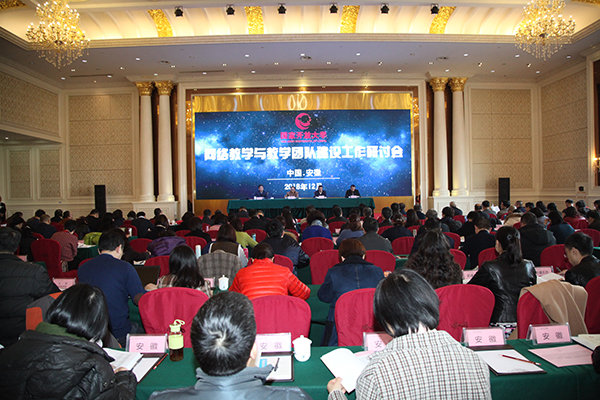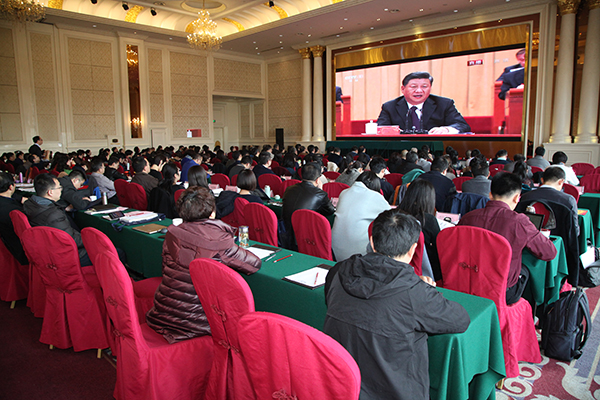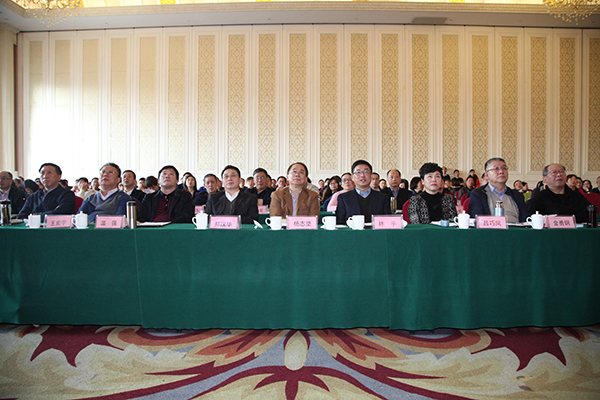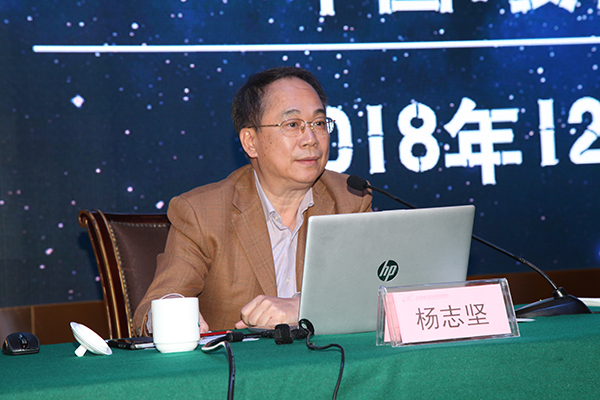 From 18-19 December 2018, a seminar on OUC online teaching and teaching team construction was held in Hefei. The theme was intensifying teaching reform, advancing teaching team construction, implementing the teaching process, and improving teaching quality. Party secretary and president of the Open University of China (OUC) Yang Zhijian, OUC vice president Lin Yu, Party secretary and president of Anhui Radio and TV University (Anhui RTVU) Zheng Hanhua, and responsible personnel from Anhui Provincial Department of Education attended the conference.
From 18-19 December 2018, a seminar on OUC online teaching and teaching team construction was held in Hefei. The theme was intensifying teaching reform, advancing teaching team construction, implementing the teaching process, and improving teaching quality. Party secretary and president of the Open University of China (OUC) Yang Zhijian, OUC vice president Lin Yu, Party secretary and president of Anhui Radio and TV University (Anhui RTVU) Zheng Hanhua, and responsible personnel from Anhui Provincial Department of Education attended the conference.



Yang Zhijian said that 2018 marks the 40th Anniversary of China’s reform and opening up and the 40th anniversary of the Radio and TV University, established with the instruction of Comrade Deng Xiaoping. The Radio and TV University (RTVU) is not only the outcome of reform and opening up but also one of its major practitioners and explorers. Over the last 40 years, the RTVU has made significant contributions to the shaping of the lifelong education system, the construction of a learning society, the development of socio-economy, and the cause of modernisation construction through arduous struggle, trials and hardships, emancipation of the mind, and reform and innovation.

Yang Zhijian pointed out that, in recent years, we have seen an increasing contradiction between growth and quality along with an increase in enrolment. As a new type of university supported by modern information technology that provides all members of society with degree and non-degree education, the OUC urgently needs to construct an online teaching team that matches the educational scale whether from the perspective of national strategic policy or the perspective of the OUC’s transformational development. In this way, it can respond effectively to society’s need for large scale talent formation. He believes that the online teaching team is a teaching organisation with a specific structure and function based on mobile and online techniques and that it supports the reform of the “six-network integration” talent formation model. We have to move towards the construction of a teaching community for the new type of university, and uphold the launch principle of building an online teaching team coordinated and implemented by the headquarters and branches based on specialties and centred on courses that rely on mobile internet and big data technology.
Yang Zhijian underlined that the OUC will earnestly learn and grasp the spirit of General Secretary Xi Jinping’s speech delivered at the meeting celebrating the 40th anniversary of reform and opening up, implement the spirit of the 19th CPC National Congress and the National Education Conference, remain true to its original aspiration and keep its mission firmly in mind, strengthen its determination to make progress towards reform and opening up, and to enhance the overall leadership of the Party over education work on the path toward the new journey. The OUC will act on a people-centric development concept, insist on running education rooted in the vast land of China, and implement the fundamental task of fostering virtue through education. The OUC will take a path towards developing into an open university with Chinese characteristics in order to make greater contributions to improving continuing education, step up efforts to build a learning society, and promote the well-rounded development of the Chinese people.
Director Ye Zhihong from the OUC Academic Affairs Department gave a special speech entitled Online Teaching and Online Teaching Team Construction from the perspective of the background, problems, reforms, and improvements in online teaching team construction. According to Ye Zhihong, online teaching team construction is of great significance in ensuring the quality of large-scale teaching. In response to the key problems of functional orientation, institutional mechanism, financial support, and coordinated management, we will foster virtue through education, strengthen the development of disciplines and majors, accelerate quality resource building, effectively improve teachers’ teaching competency and support capacity, implement teaching process, and earnestly ensure the effectiveness of teaching.
Relevant personnel the Jiangsu, Chengdu, Sichuan, Hunan, and Anhui branches, the OUC Faculty of Arts and Law, the Information Technology Department, the Faculty of International Languages and Cultures, and the Faculty of Agroforestry & Medicine also gave speeches at the conference.
The representatives at the conference discussed Party Secretary Yang Zhijian’s speech, as well as Opinions on Further Promoting the Construction of the Online Teaching Team (Draft for Soliciting Opinions). It was agreed that the conference was held at the right time, had a clear theme, had focused issues, and gave remarkable results. All the participants said that they will seriously implement the spirit of the conference and coordinate to carry out all the work.
Lin Yu gave the concluding speech and proposed three requirements for the further construction of the online teaching team. The first is to raise the awareness. The OUC must be fully aware that the construction of the online teaching team is not only the appointed task of every teacher but also the common responsibility of the educational community. We must be clear that the task can’t be fulfilled through just one meeting or the publishing of one document. It is necessary for all the local authorities to implement it as “a top leadership project”. The second is to get a clear understanding of the problems facing the construction, including the shortage and incompetence of the overall teaching team, the coordinated support of the OUC community in teaching, management, and technology, as well as the share of benefits. The last is to continue to innovate. It is necessary to stimulate the endogenous power of the system, strengthen the work enthusiasm and initiative, continue innovating the work methods, and make efforts to have the reform of the talent formation mode lifted to a new level.
A total of 167 people attended the conference, including leaders, teachers, and responsible personnel from the teaching and academic affairs departments of 43 OUC branches, relevant departments of the OUC headquarters, and the personnel in charge of teaching and academic affairs from relevant schools, as well as specially invited teacher representatives.
By Zhuge Kuanyu and Pei Haiyan, OUC